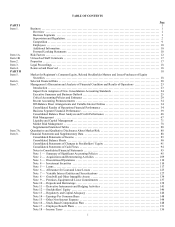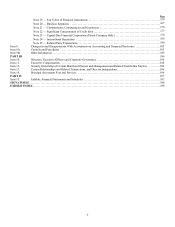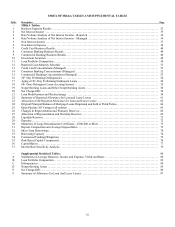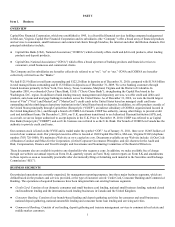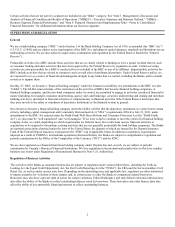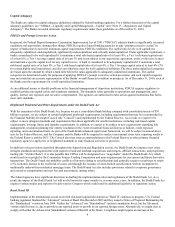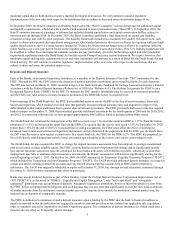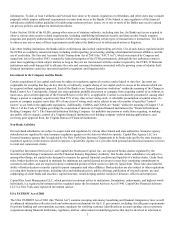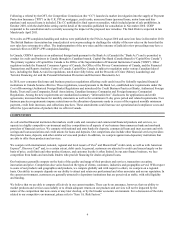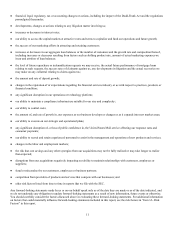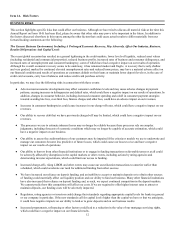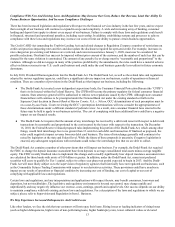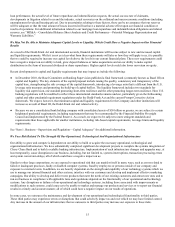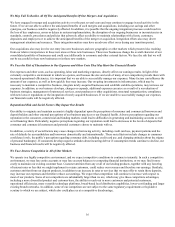Capital One 2010 Annual Report Download - page 28
Download and view the complete annual report
Please find page 28 of the 2010 Capital One annual report below. You can navigate through the pages in the report by either clicking on the pages listed below, or by using the keyword search tool below to find specific information within the annual report.8
money laundering; reporting requirements applicable to the receipt of coins and currency of more than $10,000 in nonfinancial trades
or businesses; and more broadly applicable suspicious activity reporting requirements.
The Department of Treasury, in consultation with the Federal Reserve and other federal financial institution regulators, has
promulgated rules and regulations implementing the Patriot Act that prohibit correspondent accounts for foreign shell banks at U.S.
financial institutions; require financial institutions to maintain certain records relating to correspondent accounts for foreign banks;
require financial institutions to produce certain records upon request of the appropriate federal banking agency; require due diligence
with respect to private banking and correspondent banking accounts; facilitate information sharing between government and financial
institutions; require verification of customer identification; and require financial institutions to have an anti-money laundering
program in place.
Regulation of International Business by Non—U.S. Authorities
COBNA is subject to regulation in foreign jurisdictions where it operates, currently in the U.K. and Canada.
In the United Kingdom, COBNA operates through COEP, which was established in 2000. Effective December 1, 2010, COEP became
an authorized payment institution by the Financial Services Authority (the “FSA”) under the Payment Services Regulations 2009. This
change involved a variation of COEP’s permissions to conduct certain regulated activities in the U.K. (notably cancellation of its
permission to accept deposits, which permission had been retained following COEP’s transfer of its savings business in 2009). To
facilitate the change, ownership of COEP’s immediate parent companies (Capital One Holdings Limited and Capital One Investments
Limited, both U.K. entities) was transferred from COBNA to Capital One Global Corporation (a new Virginia-chartered corporation),
all the shares of which are owned by COBNA. Capital One Global Corporation is subject to regulation as an “agreement corporation”
under the Federal Reserve’s Regulation K.
During 2010, the U.K. Government announced plans to change the structure of financial regulation by the end of 2012. As part of this
change, the FSA will cease to exist in its current form. The Government will create a new Prudential Regulatory Authority (the
“PRA”), responsible for the day-to-day prudential supervision of financial institutions, and a new Financial Policy Committee (the
“FPC”), which will look across the economy at the macroeconomic and financial issues that may threaten stability and address the
risks it identifies. In addition, a new Consumer Protection and Markets Authority (the “CPMA”) will also be established, responsible
for the conduct of all financial services firms. A “shadow” structure is expected to be built during 2011 in preparation for the changes
while the Government consults on detailed proposals. This consultation activity includes consideration of whether the U.K. consumer
credit regime currently regulated by the Office of Fair Trading (the “OFT”) should become the responsibility of the new CPMA.
Following a review of the credit card industry by the U.K. Government in late 2009, the industry and U.K. Government announced a
joint commitment to a package of measures that has been incorporated into the U.K.’s Lending Code. The key measures include
allocating customer payments to higher rate balances first; setting minimum payments on new customer accounts to cover at least
interest, fees, charges and 1% of the principal balance; creating the option for customers to opt out of unsolicited credit limit increases
and to request reductions in their credit line; providing additional communication over re-pricing of existing debt and allowing
customers to opt out of the increase and pay down their balance at the existing rate; and providing annual electronic statements to
customers regarding the cost to use a credit card over the year. It is still under discussion as to when this final standard regarding
annual statements will be implemented.
The U.K. Government has also passed the Financial Services Act 2010 which restricts the issuance of unsolicited credit card checks.
This provision of the Act will now come into effect through voluntary self-regulation, rather than proceeding with the commencement
order for this legislation, with the changes being reflected in the next edition of the Lending Code, due to be published in March 2011.
Lenders agreed to be fully compliant with these provisions by the end of 2010, in line with the other commitments that were agreed
with the U.K. Government.
Following the passing of the Consumer Credit Directive (the “CCD”) in May 2008 by the European Commission (the “EC”), the U.K.
consumer credit regime, including the laws and regulations with respect to the marketing of consumer credit products and the design
of and disclosure in consumer credit agreements, is due to change significantly. The CCD is also introducing new regulations that
require certain information be provided to consumers before a credit agreement is entered into and that provide explicit requirements
designed to ensure that any such consumer is creditworthy. The new law enacted in the U.K. to implement the CCD became fully
effective on February 1, 2011, but lenders could voluntarily comply with the legislation, with the exception of the new advertising
rules, starting April 30, 2010.
Cross-border interchange fees are under scrutiny from the EC. The timing of any final resolution of the matter by the EC or the OFT,
which has suspended its own investigation into domestic interchange, is uncertain, but it is anticipated that the OFT will await the
outcome of the EC court decision before concluding its own investigation.


